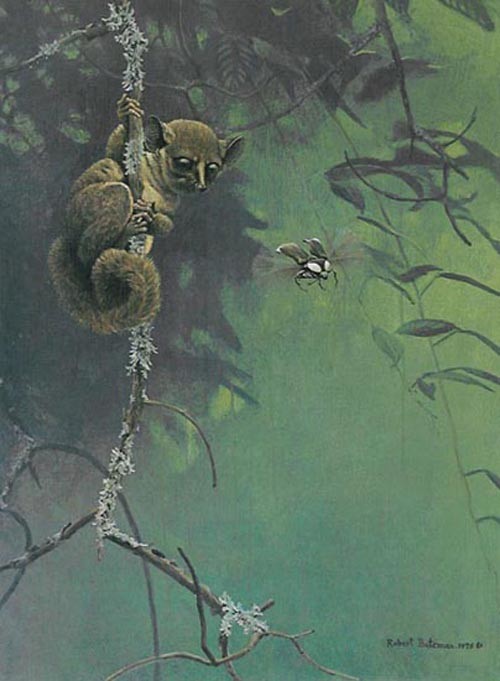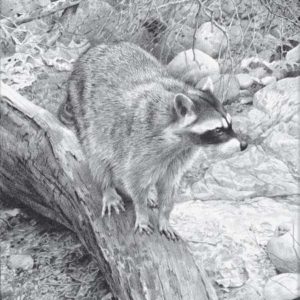Description
Bush Baby and Beetle – 14-3/4 x 11; Offset Paper;Edition Size 950; $195.00 U.S.
“ For two years I taught high school geography in southeast Nigeria. It was a remarkable experience not only because of the high scholastic demands of the students and the rich and complex West African culture, but also because of the natural environment of the tropical rainforest. Since I was a boy I had been reading the entertaining animal collecting stories of Gerald Durrell. Perhaps my favourite was the Bafut Beagles, which took place in the Cameroons.
“We lived in the same habitat about a day’s drive from Bafut. As soon as I was established and had got my bearings of the local area, I sent word out to the nearby villages that I would pay money for small wildlife. Most of these went to the collection of the Carleton University Museum but some went to the Bronx Zoo Small Animal House. The most spectacular of these were the bush babies.
“There are a number of species of bush baby (6 genera, 16 species). Ours was the seldom seen Demidov’s galago. If we humans are at the ‘top’ of the primate family tree then lemurs are at the evolutionary ‘bottom’. Demidov’s galago is the smallest member of ‘our’ family. A full grown adult would nicely fill a teacup. We had five of them and although they lived in cages we would take them out one at a time to play around the room and around us. They would scamper over our heads and poke their fingers in our ears, which resulted in a sticky feeling. Afterwards I learned that, being nocturnal, they would find their way back to their nest in the forest canopy by urinating on their hands and feet on their way out, and that is why they were sticky. I have shown this one eyeing a large tropical beetle which it may or may not succeed in catching.” – Robert Bateman
Biography
Robert Bateman has been called the most famous living artist. He continues to paint and tour the world to promote conservation and preservation of nature. We have represented Robert Bateman for decades and are now the sole publisher and distributor of his reproductions. We are so honored to work with him and witness his success. He has made such a massive contribution to the art world and the natural world as an artist and educator of the earth’s most important resources.
Nature as a subject is becoming more and more popular as our environment is in peril. What better subject is there than the beautiful creatures we share this world with? Robert Bateman’s appreciation and understanding of nature are apparent in his paintings. He is able to paint flora and fauna the way your eye would perceive it in real life. It is important that the animal takes full attention. The background becomes muted, and therefore it doesn’t take too much focus away from the subject. His paintings seem effortless and masterful all at once.
Bateman’s eye for composition is unparalleled. Each painting is a composed like a symphony, leading the eye to wander. From the backyards of North America to the sprawling plains of Africa. Robert Bateman captures nature the way it should be enjoyed. Above all he is a champion of wildlife. For this reason he has become a household name for art collectors.


